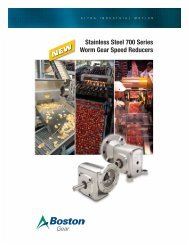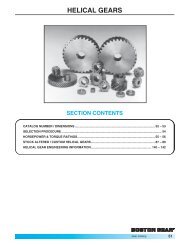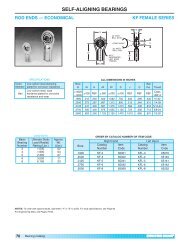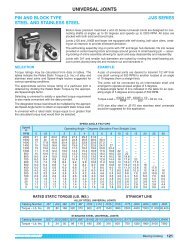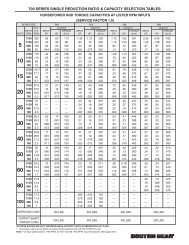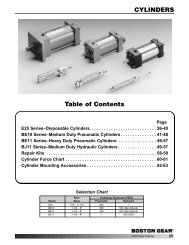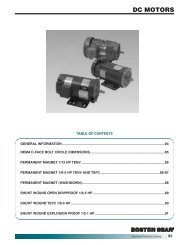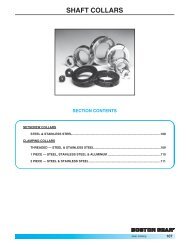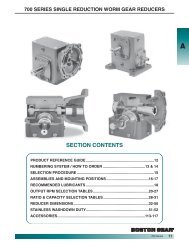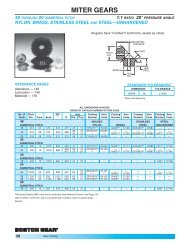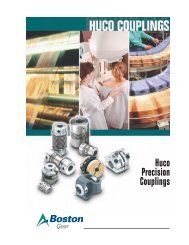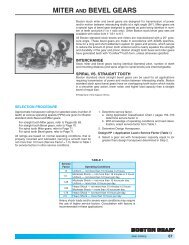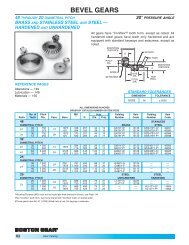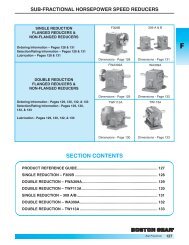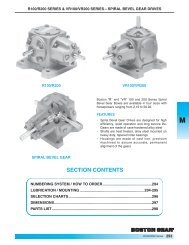Modified Stock Gearing - Boston Gear
Modified Stock Gearing - Boston Gear
Modified Stock Gearing - Boston Gear
You also want an ePaper? Increase the reach of your titles
YUMPU automatically turns print PDFs into web optimized ePapers that Google loves.
Chain Drives<br />
Roller Chain Drive Selection (Continued)<br />
A roller chain consists essentially of numerous small bearings<br />
operating under high pressures and requires adequate<br />
lubrication. There are four basic types of lubrication suggested<br />
for chain drives, depending upon the chain speed and the<br />
power transmitted. The Horsepower Rating Tables indicate the<br />
type of lubrication recommended.<br />
Type I—Manual Lubrication<br />
Manual lubrication is accomplished by applying oil with a brush<br />
or spout can to the inside of the chain at the edges of the side<br />
plates. Volume and frequency should be determined by<br />
periodic inspection.<br />
TYPE II—Drip Lubrication<br />
Oil is directed between link plate edges to a drip lubricator. Only<br />
enough oil to keep the chain moist is necessary and a light metal<br />
splash guard will keep the floor and surroundings clean.<br />
TYPE III—Bath or Disc Lubrication<br />
With bath lubrication, the lower strand of the chain runs<br />
through a sump of oil. The oil level should reach the pitch line<br />
of the chain at its lowest point while operating. With disc<br />
lubrication, the chain operates above the oil level. The disc<br />
picks up oil from the sump and deposits it on the chain, usually<br />
by means of a trough. The disc diameter should be such as to<br />
produce rim speeds from 600 minimum to 8000 maximum<br />
FPM. This type of lubrication requires that the drive be<br />
enclosed in an oil tight chain case.<br />
TYPE IV—Oil Stream Lubrication<br />
The lubricant is usually supplied by a circulating pump capable of<br />
supplying the chain drive with a continuous stream of oil. The oil<br />
should be applied inside the chain loop evenly across the chain<br />
width, and directed at the lower strand. This type of lubrication<br />
requires that the drive be enclosed in an oil tight chain case.<br />
Recommended lubricant viscosities for various ambient<br />
temperatures are listed in the following table:<br />
Temp.<br />
Temp.<br />
Lubricant<br />
Degrees F.<br />
Degrees F.<br />
Lubricant<br />
20-40 SAE20 100-120 SAE-40<br />
40-100 SAE30 120-140 SAE50<br />
SURROUNDING CONDITIONS—Abrasive, corrosive, or high<br />
temperature conditions can shorten chain life. If adverse<br />
conditions exist, special precautions should be taken. It may<br />
be advisable to use a drive with higher capacity than normal,<br />
stainless steel chain, etc.<br />
Roller chain drives may be selected with the following<br />
procedure:<br />
a. From Table #1 of the Application Classification Chart on<br />
Pages 323-324 determine the Service Factor.<br />
b. Multiply the Application HP by the Service Factor to obtain a<br />
Design HP.*<br />
c. The Selection Table below may be used to select an<br />
appropriate chain size using a sprocket of 17 teeth or larger.<br />
d. From the appropriate horsepower rating table (pages 260-<br />
262 determine the minimum size sprocket needed to provide,<br />
at the required speed, a rating equal to (or greater than) the<br />
Design horsepower.<br />
e. The Tables on pages 263-265 may then be used to select<br />
number of sprocket teeth, shaft center distance and chain<br />
length of a drive suitable for the application.<br />
*For Stainless Steel Chains, operating under wet or dry<br />
conditions, the Design Horsepower must be multiplied by a<br />
Factor (see Table below) for selection purposes.<br />
NOTE: Standard Steel Chains are not recommended for wet or<br />
dry applications.<br />
Application Conditions<br />
Factor<br />
Wet (Moisture) 2.0<br />
Dry (Unlubricated) 5.0<br />
Horsepower ratings of Multiple Strand chain may be obtained<br />
by multiplying the Single Strand rating by the proper Factor<br />
from the following table:<br />
MULTIPLE STRAND RATING FACTORS<br />
Number of Strands Double Triple Quadruple<br />
Rating Factor 1.7 2.5 3.3<br />
*These Horsepower Ratings are based on certain operating<br />
conditions, see Page 258.<br />
SELECTION TABLE<br />
RPM<br />
DESIGN HORSEPOWER<br />
Smaller 1/2 1 1-1/2 2 3 4 5 7-1/2 10 15 20 25 30<br />
Sprocket CHAIN NUMBER<br />
1800 25 25 35 35 35 40 40 40 50 80 60–2 80–2 —<br />
1500 25 25 35 35 35 40 40 40 60 60 80 60–2 80–2<br />
1200 25 35 35 35 40 40 40 50 60 60 60 80 100<br />
1000 25 35 35 35 40 40 40 50 60 60 80 80 80<br />
800 25 35 35 40 40 40 50 50 60 60 80 80 80<br />
700 25 35 35 40 40 50 50 50 60 80 80 80 80<br />
600 35 35 35 40 40 50 50 60 60 80 80 80 100<br />
500 35 35 40 40 50 50 50 60 80 80 80 100 100<br />
400 35 35 40 40 50 50 60 60 80 80 100 100 100<br />
350 35 40 40 40 50 50 60 80 80 80 100 100 100<br />
300 35 40 40 50 50 60 60 80 80 100 100 100 120<br />
250 35 40 40 50 50 60 60 80 80 100 100 120 120<br />
200 35 40 50 50 60 60 80 80 80 100 120 120 120<br />
175 40 40 50 50 60 80 80 80 100 100 120 120 140<br />
150 40 50 50 60 60 80 80 80 100 120 120 120 140<br />
125 40 50 50 60 80 80 80 100 100 120 120 140 140<br />
100 40 50 60 60 80 80 80 100 100 120 140 140 160<br />
80 40 50 60 80 80 80 100 100 120 140 140 160 160<br />
70 50 60 60 80 80 80 100 120 120 140 160 160<br />
60 50 60 80 80 80 100 100 120 120 140 160<br />
50 50 60 80 80 80 100 100 120 140 160 160<br />
40 50 60 80 80 100 100 120 120 140 160<br />
30 60 80 80 100 100 120 120 140 160<br />
25 60 80 80 100 120 120 140 140 160<br />
20 60 80 100 100 120 120 140 160<br />
15 80 100 100 120 120 140 160<br />
10 80 100 120 120 140 140<br />
H<br />
P-1930-BG 04/10 <strong>Boston</strong> <strong>Gear</strong> 800-825-6544 259



